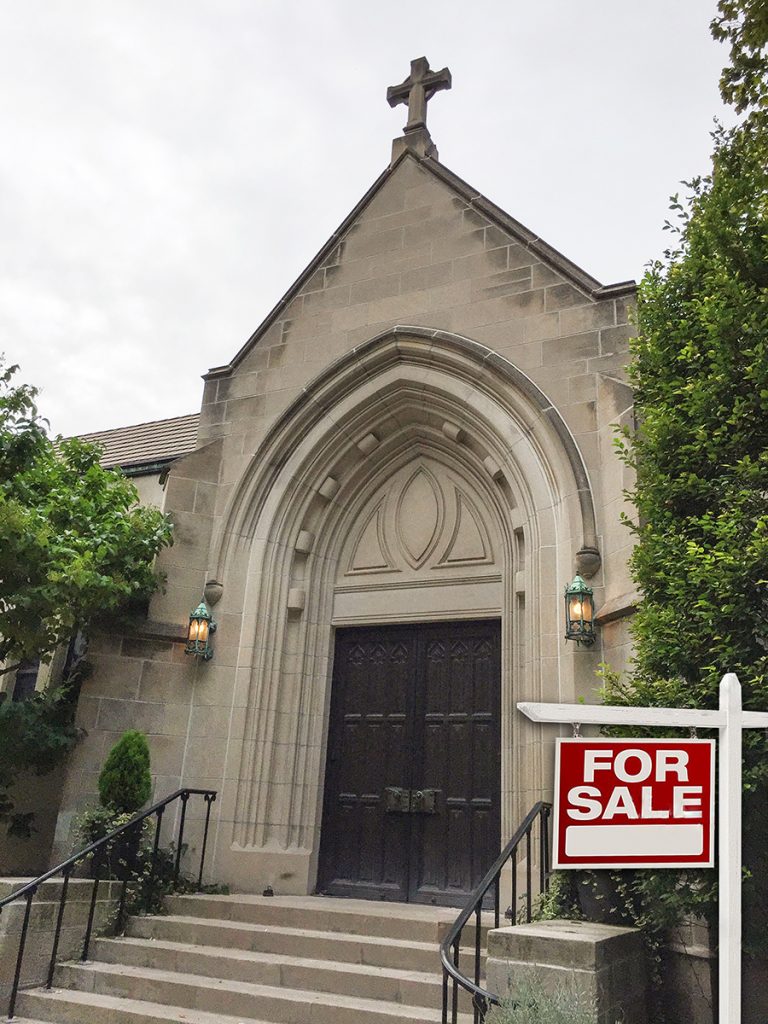Assuming your congregation is incorporated and has decided that it’s time to sell your property, several steps need to be taken to make sure that endeavor is handled responsibly. This involved acting in the best interest of the congregation/corporation, the governing documents, and the applicable state laws.

Ownership:
Not all churches own their property. Your real property may be owned by your denomination, regional office, synod, or similar as opposed to your congregation. How title to the property is held will most likely be set forth in a recorded deed that can be obtained through the local county recorder’s office or title company.
Once you have a copy of the deed, it is important to check how the title is held to ensure the church is the sole owner of the property and the name of the owner of record. Often, clouds on title will arise from a defective deed in the form of the improper name of the Grantee. For example, when a church is incorporated as “The Church of Southern California” but the grantee is listed on the deed as “The Church of California”, the latter is the owner of record. In such an instance, an attorney or title company may need to assist in correcting this error. Otherwise, the church would be unable to convey clear/marketable title to the property.
Governing Documents:
Your church will have set forth its governance in the form of a constitution, bylaws, or a condemnation thereof. These documents will determine how your church may own and sell real property. As a non-profit corporation, the power lies with the members of the congregation as opposed to shareholders or a board of directors.
Generally speaking, the corporation will have the power to buy, sell, and encumber real property upon the approval of a majority of the active and voting members. These documents will also set forth how that approval may be sought, such as calling a congregational meeting as per the requirements of the bylaws. Often, a congregation will agree to sell its property with a caveat that the Church Council seek a buyer and return with a bona fide offer for approval by the congregation.
Throughout the process, these governing documents must be followed and accompanied by minutes and resolutions granting the appropriate individuals the capacity to legally bind the corporation and transfer title.
Representation:
Now that the congregation has approved the selling of the property, the church will need to secure proper representation to ensure the matter is handled properly and in the best interest of the church.
Inherently, all churches have members who are also licensed by the state to broker real estate transactions. Church members by their very nature have a conflict of interest. Are they working for their church or their well-being?
As hinted above, selling special use/religious property is complex and involves far more than holding an open house and signing on the dotted line. Although the location is always key, the underlying zoning of the property has a far greater effect on the ultimate value of the property to a potential buyer. After all, the property only has value to the buyer if they can utilize the property for their intended purpose.
Value:
There is more than a singular value to church property depending on who the ultimate buyer is. To arrive at these values, it is important to consider the site feasibility and economic value of the property. In other words, if a church is located in a residential zone and does not have a benefit of a Conditional Use Permit, some church buyers may not be willing to purchase the property. Similarly, a residential developer may value the property for a higher amount than a church would.
In determining the value of your property, is it important to obtain more than a simple Broker’s Opinion of Value by way of a zoning or market analysis. As part of this analysis, it is important to obtain and understand a Title/Preliminary Report of the property. This report will outline the legal description of the property, and note any encumbrances (mortgages, deed restrictions, outstanding taxes, and easements), all of which affect the use of and transfer of title. When used properly, this report will uncover potential challenges to the sale process that might impact the ultimate value realized.
California Attorney General:
A religious corporation must give written notice to the Attorney General 20 days before it sells, leases, conveys, exchanges, transfers or otherwise disposes of all or substantially all of its assets unless the Attorney General has given the corporation a written waiver of this section as to the proposed transaction. That notice must include a: (i) letter signed by an attorney or a director of the corporation describing the proposed action; (ii) copy of the resolution of the board of directors authorizing the proposed action; (iii) copy of the corporation’s current financial statement; and (iv) copy of the corporation’s articles of incorporation. In addition, the Attorney General may require an independent appraisal or other evidence that the sale price and terms are fair to the corporation.
Note:
No portion of any fees, or money received from the sale of the church property can be distributed or otherwise inure to the benefit of any private individual.
Please see our other related articles
Why Use Bushore Real Estate
How Zoning Codes Effect Churches
Incorrect Deeds
Legal nonconforming Use
Disclaimer: Every situation is different and particular facts may vary thereby changing or altering a possible course of action or conclusion. The information contained herein is intended to be general in nature as laws vary between federal, state, counties, and municipalities and therefore may not apply to any given matter. This information is not intended to be legal advice or relied upon as a legal opinion, course of action, accounting, tax, or other professional services. You should consult the proper legal or professional advisor knowledgeable in the area that pertains to your particular situation.
